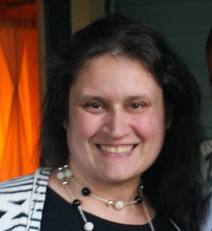Louisville native Emily Albrink, soprano
Photo-Arielle Doneson
Music without Borders: Amadeus
Louisville Orchestra
Bob Bernhardt, conductor
Emily Albrink, soprano
Review by Annette Skaggs
Entire contents copyright © 2014 by Annette Skaggs. All rights reserved
It may have been cold outside for the latest installment of the LG&E sponsored Louisville Orchestra’s Music without Borders series “Amadeus”, but I assure you the music and hospitality of the hosts and musicians provided warmth.
A sold-out audience gathered at St. Francis of the Fields to enjoy the talents of the always-entertaining Bob Bernhardt conducting the orchestra with the lovely and engaging Emily Albrink (Katz) as guest soloist.
As the title suggests the evening focused on Wolfgang Amadeus Mozart and some of his most recognizable works, with a couple not so famous thrown in. But also as the title states, Amadeus is the name of the popular Peter Shaffer play and movie, so, why not throw in a little Salieri for good measure.
In his classic, comedic style Maestro Bernhardt addressed the audience by letting us know that we were there to celebrate the great works of Carl Von Dittersdorf, a fellow composer and contemporary of both Mozart and Salieri. Did you know that Von Dittersdorf was a Silvologist?
The evening began with the instantly recognizable Overture to The Marriage of Figaro (Le Nozze di Figaro) and I dare say that the orchestra could have played this from memory. In fact, I don’t remember seeing a lot of page turning from the music stands. The Cello Obligato solo by Joe Caruso was very entertaining. Great tempo and energy.
Ms. Albrink’s Batti, batti o bel Masetto (Beat, beat or nice Musetto) from Don Giovanni was warm and inviting. As the character Zerlina sings of her love and devotion and innocence to her husband Masetto, even if it means to be beaten. Of course in today’s culture we get a little squeamish to hear of such, but when the opera was written in 1787, it was the norm.
Ach, ich fühl (Oh, I feel), Pamina’s haunting aria from The Magic Flute (Die Zauberflӧte), Mozart’s final opera. The Magic Flute is certainly a departure from the other operas that Mozart had written as it was composed in the style of singspiel and filled with Masonic rituals and dizzying busyness. But as Ms. Albrink cleverly pointed out, when Pamina begins to sing this aria time stands still within the opera and you are entranced with the plight of which Pamina sings: pained not knowing if her true love Tamino loves her. Ms. Albrink captures that aria spotlight beautifully.
Going back to Le Nozze di Figaro, Ms. Albrink treated us to the first serenade written for a female character, Suzanna’s Deh vieni non tardar (Oh come, do not delay). One could certainly sense and hear the sentiments of love and companionship in Ms. Albrink’s versatile register.
One of the many things that I appreciate about Maestro Bernhardt is that he is a wealth of information, and for this music geek, I look forward to what he shares with us. Did you know that there was really not a feud between Salieri and Mozart; that they actually worked together? Did you know that while both composers worked in the Austrian Court that they were commissioned to compose a piece and asked to perform them at the same time on opposite sides of the palace….a Battle of the Bands if you will? I’m not going to say who won though. J
Salieri’s Overture to Prima la musica, e poi le parole (First the music, then the lyrics), played with verve and confidence by our orchestra, was actually written as a parody to the relationship between composer and librettist, or poet (maybe an affront to da Ponte, who collaborated with both Mozart and Salieri).
My thanks to the Maestro for pointing out one of the common themes of writing/composing during that time in Austria, the misuse of the lower strings (viola, cello and bass). Luckily for us, Mozart noticed that problem and did well to fix it.
Serenade No. 6 in D Major (Serenata notturna), although not as commonly played as the Haffner, it is still a lovely piece. In the second movement we are serenaded by a string trio. The trio was so good in fact that the maestro stopped conducting while the soloists did their thing. If you were not paying attention to what was being played by Principal Violinist Michael Davis than you’d be missing out on some musical fun.
One of the most gorgeous musical settings to the word Alleluia comes from Mozart’s Exsultate jubilate (Exult, rejoice). Ms. Albrink and the Louisville Orchestra certainly did not disappoint. The vocal acrobats of this solo section, especially in the top range, were pitch perfect and strong and the orchestra’s accompaniment was spot on.
The last piece of the evening was the Symphony No. 31 in D Major (Paris Symphony). With the whole of the orchestra employed at the beginning, the Symphony also allowed for softer, almost reflective moments.
There were many reasons to love this set of pieces. One, they sounded great, two, they were well chosen for familiarity and introduction, and, lastly, the vocal arias were perfect examples of the strength and power that a woman is capable of; a point which Mozart appreciated and recognized in his works.
So, bundle up and take a chance on learning and listening at the next two performances of the Louisville Orchestra’s Amadeus with Emily Albrink.
Bravo Tutti
Amadeus
Friday, January 9, 2015 – 7:30pm
St. Francis Episcopal Church
6710 Wolf Pen Branch Road
Harrods Creek, KY 40027
Saturday, January 10, 2015 – 7:30pm
The Ogle Center
4201 Grant Line Road
New Albany, IN 47150
Sunday, January 11, 2015 – 3:00pm
Congregation Adeth Jeshrun
2401 Woodbourne Avenue
Louisville, KY 40205
Louisvilleorchestra.org
 [box_light]Annette Skaggs is a heavily involved Arts Advocate here in Louisville and freelance professional opera singer who has performed throughout Europe, St. Louis, Cincinnati, Boulder, Little Rock, Peoria, Chicago, New York and of course Louisville. Aside from her singing career she has been a production assistant for Kentucky Opera, New York Opera and Northwestern University. She has a 25+ year knowledge of the Classical Arts.[/box_light]
[box_light]Annette Skaggs is a heavily involved Arts Advocate here in Louisville and freelance professional opera singer who has performed throughout Europe, St. Louis, Cincinnati, Boulder, Little Rock, Peoria, Chicago, New York and of course Louisville. Aside from her singing career she has been a production assistant for Kentucky Opera, New York Opera and Northwestern University. She has a 25+ year knowledge of the Classical Arts.[/box_light]



